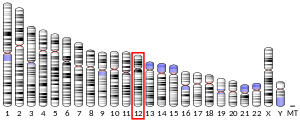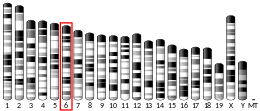COPS7A
COP9 signalosome complex subunit 7a is a protein that in humans is encoded by the COPS7A gene.[5]
References
- GRCh38: Ensembl release 89: ENSG00000111652 - Ensembl, May 2017
- GRCm38: Ensembl release 89: ENSMUSG00000030127 - Ensembl, May 2017
- "Human PubMed Reference:". National Center for Biotechnology Information, U.S. National Library of Medicine.
- "Mouse PubMed Reference:". National Center for Biotechnology Information, U.S. National Library of Medicine.
- "Entrez Gene: COPS7A COP9 constitutive photomorphogenic homolog subunit 7A (Arabidopsis)".
External links
- Human COPS7A genome location and COPS7A gene details page in the UCSC Genome Browser.
Further reading
- Wolf DA, Zhou C, Wee S (2004). "The COP9 signalosome: an assembly and maintenance platform for cullin ubiquitin ligases?". Nat. Cell Biol. 5 (12): 1029–33. doi:10.1038/ncb1203-1029. PMID 14647295.
- Seeger M, Kraft R, Ferrell K, et al. (1998). "A novel protein complex involved in signal transduction possessing similarities to 26S proteasome subunits". FASEB J. 12 (6): 469–78. doi:10.1096/fasebj.12.6.469. PMID 9535219.
- Wei N, Tsuge T, Serino G, et al. (1998). "The COP9 complex is conserved between plants and mammals and is related to the 26S proteasome regulatory complex". Curr. Biol. 8 (16): 919–22. doi:10.1016/S0960-9822(07)00372-7. PMID 9707402.
- Bech-Otschir D, Kraft R, Huang X, et al. (2001). "COP9 signalosome-specific phosphorylation targets p53 to degradation by the ubiquitin system". EMBO J. 20 (7): 1630–9. doi:10.1093/emboj/20.7.1630. PMC 145508. PMID 11285227.
- Lyapina S, Cope G, Shevchenko A, et al. (2001). "Promotion of NEDD-CUL1 conjugate cleavage by COP9 signalosome". Science. 292 (5520): 1382–5. doi:10.1126/science.1059780. PMID 11337588.
- Wang Y, Devereux W, Stewart TM, Casero RA (2002). "Polyamine-modulated factor 1 binds to the human homologue of the 7a subunit of the Arabidopsis COP9 signalosome: implications in gene expression". Biochem. J. 366 (Pt 1): 79–86. doi:10.1042/BJ20020211. PMC 1222765. PMID 12020345.
- Hoareau Alves K, Bochard V, Réty S, Jalinot P (2002). "Association of the mammalian proto-oncoprotein Int-6 with the three protein complexes eIF3, COP9 signalosome and 26S proteasome". FEBS Lett. 527 (1–3): 15–21. doi:10.1016/S0014-5793(02)03147-2. PMID 12220626.
- Strausberg RL, Feingold EA, Grouse LH, et al. (2003). "Generation and initial analysis of more than 15,000 full-length human and mouse cDNA sequences". Proc. Natl. Acad. Sci. U.S.A. 99 (26): 16899–903. doi:10.1073/pnas.242603899. PMC 139241. PMID 12477932.
- Serino G, Su H, Peng Z, et al. (2003). "Characterization of the Last Subunit of the Arabidopsis COP9 Signalosome: Implications for the Overall Structure and Origin of the Complex". Plant Cell. 15 (3): 719–31. doi:10.1105/tpc.009092. PMC 150025. PMID 12615944.
- Uhle S, Medalia O, Waldron R, et al. (2003). "Protein kinase CK2 and protein kinase D are associated with the COP9 signalosome". EMBO J. 22 (6): 1302–12. doi:10.1093/emboj/cdg127. PMC 151059. PMID 12628923.
- Groisman R, Polanowska J, Kuraoka I, et al. (2003). "The ubiquitin ligase activity in the DDB2 and CSA complexes is differentially regulated by the COP9 signalosome in response to DNA damage". Cell. 113 (3): 357–67. doi:10.1016/S0092-8674(03)00316-7. PMID 12732143.
- Ota T, Suzuki Y, Nishikawa T, et al. (2004). "Complete sequencing and characterization of 21,243 full-length human cDNAs". Nat. Genet. 36 (1): 40–5. doi:10.1038/ng1285. PMID 14702039.
- Gerhard DS, Wagner L, Feingold EA, et al. (2004). "The Status, Quality, and Expansion of the NIH Full-Length cDNA Project: The Mammalian Gene Collection (MGC)". Genome Res. 14 (10B): 2121–7. doi:10.1101/gr.2596504. PMC 528928. PMID 15489334.
- Obuse C, Iwasaki O, Kiyomitsu T, et al. (2004). "A conserved Mis12 centromere complex is linked to heterochromatic HP1 and outer kinetochore protein Zwint-1". Nat. Cell Biol. 6 (11): 1135–41. doi:10.1038/ncb1187. PMID 15502821.
- Stelzl U, Worm U, Lalowski M, et al. (2005). "A human protein-protein interaction network: a resource for annotating the proteome". Cell. 122 (6): 957–68. doi:10.1016/j.cell.2005.08.029. hdl:11858/00-001M-0000-0010-8592-0. PMID 16169070.
This article is issued from Wikipedia. The text is licensed under Creative Commons - Attribution - Sharealike. Additional terms may apply for the media files.




